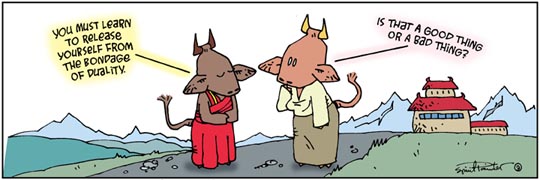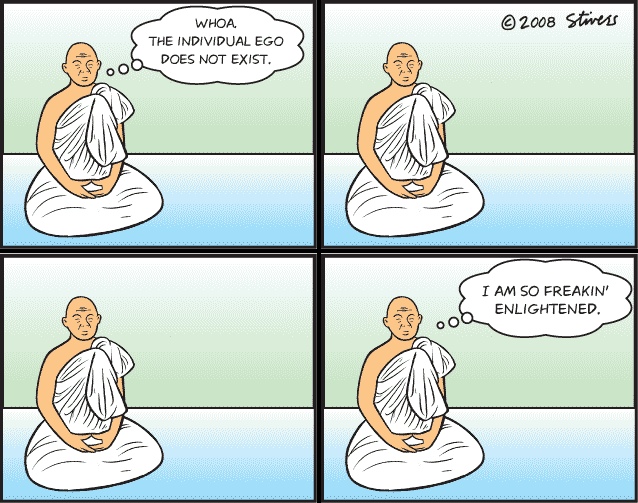Things work well with opposites. Two political parties – because they watch each other. Good people, to make the world go round and balance out the bad people. Sheep and wolves. Two rows of teeth. Meditation and partying.
But when it comes to Moksha, enlightenment as it is called in Indian Philosophy, there is only one.
It is called ‘Non-duality’.
And it refers to the ultimate nature of the universe; but, and here’s the catch, only as it is known by one who is fully enlightened. You find it in the Indian school of thought Advaita Vedanta.
Now, there are thousands of long texts on this topic, mostly finding a source in the Indian sage Adi Shankara, from around 500 to 1000 years after the Buddha. But we can summarize it in a couple of words as an ultimate oneness, a ‘non-dual consciousness’, an awakened state which can hold neither subject nor object.
Something like that anyway.

It is the ultimate paradox – if there is no duality, there is no delusion/enlightenment, there is nothing to attain or person to be unattained. In fact, you must already be fully enlightened!
Even before Shankara, these ideas were growing in Mahayana Buddhism. They are proposed by Tibetan Buddhism, as a superior way than Theravada Buddhism – they say that with Theravada you are starting from an unenlightened state, and have to pass through many thousands of lifetimes to purify the mind, so that you will know the enlightened state.
Whereas for the Mahayana practitioner, they understand they are already enlightened.
Of course the arguement breaks down quite quickly upon closer inspection. If non-duality is the nature of the universe, then there aren’t really two different paths. We must all be enlightened regardless of our ‘path’. Otherwise there’s a duality of paths! Further, just having a view does not make you enlightened. There is clearly still some work to be done!

Probably the teaching arose in opposition to the Theravada Commentarial tradition: this was the standard-paradigm interpretation of the Buddha’s teachings that grew up centered in Sri Lanka 500-1000 years after the Buddha. The Commentators felt it was too difficult to get enlightened, and that it would take thousands of lifetimes. This despite the fact that in the Pali suttas there is no such suggestion. In the Buddha’s time people got enlightened right away.
To get deeper into the topic we have to
consider what enlightenment actually is!
If we look closer however we do find this idea of non-duality even in the original texts. The Buddha spoke of the ‘Unconditioned‘ as the goal of the spiritual life. This unconditioned does not rest upon ‘conditions’ i.e. it is not ‘born’ and it does not ‘arise’ and it does not change. That’s pretty much non-duality, since anything appearing in the realm of duality, is something that has components and will change.
The ‘Unconditioned’ is also known as the Amata – the Deathless. In fact, this is what Siddharta was seeking when he set out from his home and entered the forests. When he finally attained enlightenment, the first thing he reports is “I have found the Amata“.
So the ‘Unconditioned’, which is the goal of the holy life in Buddhism, must be something that is pre-existing, and not something that arises as a state of mind – as any state of mind will change and cease. Well then, maybe we really are enlightened, but there is just some kind of fog, a cover preventing us from knowing it:
This mind, monks, is luminous, but it is defiled by extraneous defilements that the uninstructed ordinary man does not understand as it really it. Therefore, there is no mind development for the uninstructed ordinary man I declare.
This mind monks, is luminous, and it is released from extraneous defilements. That – the instructed noble disciple understands as it is. Therefore there is mind development for the instructed noble disciple I declare. Ud 80
Maybe, this quality-free non-duality is exactly what was already described:
Consciousness which is non-manifestive, endless, lustrous on all sides… Here it is that earth, water, fire and air no footing find. Here again are long and short, fine and course, pleasant and unpleasant, and name-and-form cut off without exception. When consciousness comes to cease – all these are held in check herein. [D1.223]
There monks, I declare is no coming, no going, no stopping, no arising or passing away. It is not established, it does not go on, it has no subject. This indeed is the end of suffering.
[Ud 81]
In fact, just in case you are feeling particularly open minded, we can even look to Christianity for similar ideas. ‘God’ is not a ‘created’ thing – because all conditioned things arise and pass away. God by definition is the Uncreated (sound familiar?). Perhaps His non-dual nature is why His love shines like “the sun shines on the good and the evil, and the rains falls on the Just and the Unjust alike”.
Here’s the fact of the matter:- whether you think of yourself as already enlightened or not, you clearly have some work to do. No, you can’t create enlightenment as a state of mind. But a perfectly enlightened one, a Sammasambuddha, teaches that there ARE certain practices you can undertake that will take you in the right direction.
There ARE Hindrances that are “causes of blindness, causes of ignorance, destructive to wisdom, not conducive to Nibbana” (SN 46:40)
Whatever practise you undertake, it cannot be divorced from some kind of conceptual framework. The framework is what the Buddha called a ‘raft’ – something you make from the bits and pieces lying nearby into a vehicle for taking you over the sea (of senses).
In the meantime, the ultimate nature of the universe may be non-duality, but right now I am happy to be putting cream in my coffee!
___________________________________________________________
We will be exploring this topic further with our visiting teacher Radha Nicholson, on Wednesday 9th July 2014
___________________________________________________________
I wonder how many of you realize that we are put together by thought. Your gods are put together by thought. All the rituals, all the dogmas, the philosophy, are all put together by thought, and thought is not sacred. Thought is always limited. Thought has created an image about you as the audience, about you as the wife and the husband, about you as the Indian and he as the American, and so on. It is these images which are unreal, which are dividing humanity. You should never call yourself an Indian, Russian or American; we are human beings. Then we should have no wars. We should have global government, global relationship, but you are not interested in all that. ~ J. Krishnamurti
